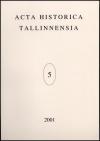Gruusia-Abhaasia sõda Abhaasia Eestlaste Mälestustes
Georgian–Abkhazian War in the Memories of Estonians in Abkhazia
Author(s): Aivar JürgensonSubject(s): Military history, Government/Political systems, Transformation Period (1990 - 2010), Inter-Ethnic Relations
Published by: Teaduste Akadeemia Kirjastus
Summary/Abstract: The Estonians in Abkhazia have a predominantly negative, not to say hostile, attitude toward Georgia. On the one hand, the attitude has been shaped by the fact that Abkhazia and the Estonian villages were part of the Georgian S.S.R. during the Soviet era. However, it has been impacted primarily by the bloody Georgian–Abkhazian war in 1992–1993. At that time, Georgia was perceived as an aggressive and dangerous neighbour, and this is still true today. The war affected many people personally, and hundreds of Estonians left Abkhazia during and after the war. The article examines the wartime memories of Estonians in Abkhazia. The article does not try to reconstruct the wartime events, but rather to ascertain how the war is remembered, by determining which themes are most important when discussing the war and which receive less attention. The primary objective of the article is to present a humanising perspective of this significant historical event, and this also encompasses the meanings of war attributed to war from a present-day perspective by people who have suffered through it, i.e. how war has affected their lives. The keyword of war memories is fear, something that was constantly felt during the shootings, rocket attacks and bombings during the war in 1992–1993; and everything that this destruction entailed – both in the physical world and in people’s psyches. The Estonian civilian casualties are talked about and thanks are given that they themselves survived. Almost everyone I interviewed presented an Abkhazian version of the war and dismissed Georgia’s accusations as false propaganda. The Georgians are accused of aggression and the Abkhazians and other residents of Abkhazia, who were defending their homeland, are justified. The rumours of war crimes committed by Abkhazians are denied and stories are told that depict the Georgians as war criminals. The actions of the Abkhazians are justified based on the prior actions of the Georgians. Examples are also given of how the Estonian government’s favourable attitude toward Georgia undermined the position of the Estonians living in Abkhazia: the local residents consider their Estonian neighbours to be responsible for the activities of the Estonian government. The heroisation of the war, which has occurred in historical writings about Abkhazia after the war, has also left its mark on the wartime memories of local Estonians. The freedom-fighting narrative, which is clearly anti-Georgian, is mirrored in both Abkhazian historiography and the stories of those who survived the war. Besides the historical image being instilled in Abkhazia, which is also being promoted by the media, a psychological factor is also responsible for the relatively similar tone of the memories: when talking about the past, one seeks to reconcile with it. The choices made at the time need to be justified and explained, i.e. interactive immortalisation intended not only for the interviewer who has arrived from Estonia, but actually also for oneself. One’s personal choices must be situated in a logical place in one’s biography. A quarter of a century ago, when people made their choices, they did not know how the war would end. During the war, the Estonians were provided with the choice between staying in Abkhazia or leaving – at the time, the Estonian state provided help to those who wanted to evacuate from the war zone. In people’s memories, the war is responsible for destruction, losses, fears, but also for the opportunities and living conditions in present-day Abkhazia.
Journal: Acta Historica Tallinnensia
- Issue Year: 2016
- Issue No: 22
- Page Range: 112-141
- Page Count: 30
- Language: Estonian

